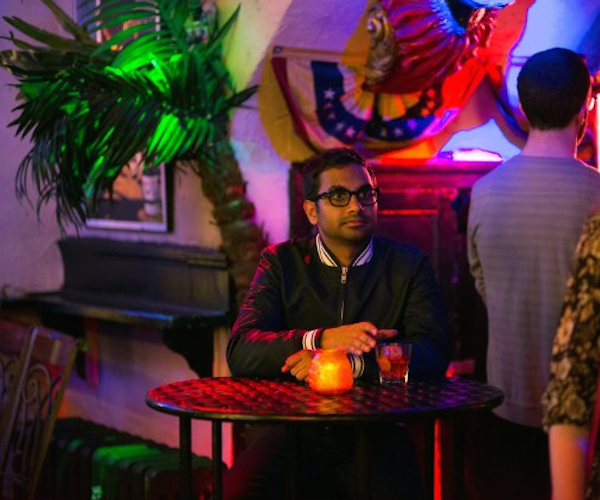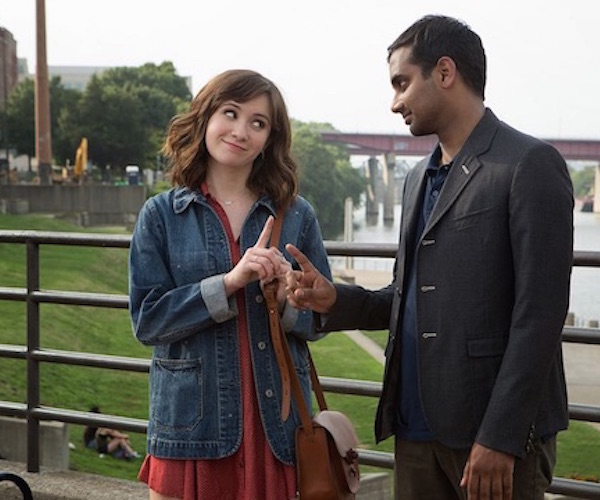TV Review: “Master of None”—Aziz Ansari’s Masterful New Show
Master of None is an exercise in emotionally intelligent storytelling that delves into the real lives of its characters.
Master of None. Season One available on Netflix. Created by Aziz Ansari and Alan Yang.

Aziz Ansari is the co-creator and star of “Master of None,” available on Netflix. Photo: K.C. Bailey/Netflix.
By Alissa Darsa
Aziz Ansari is having a very good year. The former Parks and Recreation star released his standup special Aziz Ansari: Live at Madison Square Garden; his book Modern Romance (with co-author Eric Klinenberg) became a New York Times bestseller; and his new show, Master of None, premiered November 6 on Netflix to rave reviews.
Created by Ansari and former Parks and Rec producer Alan Yang, Master of None focuses on the personal and professional life of Dev (Ansari), a 30-year-old actor in New York City. Following in the footsteps of comedians like Louis C.K. and Jerry Seinfeld, Master of None adopts a semi-autobiographical structure. Each episode offers a small snapshot of Dev’s life in the context of a larger theme, tackling issues of racism, feminism, the generation gap, and relationships. On the surface, it may be easy to dismiss this show and its man-child protagonist as just another glib treatise on the culture of extended adolescence. And it is, in a way. But it is also an exercise in emotionally intelligent storytelling that delves into the real lives of its characters. Dev is, to a large extent, a stand-in for so many Millennials, yet, he is also uniquely positioned as a first-generation Indian American immigrant. This is the show’s heart: it mines the universality of Dev’s (and Ansari’s) experiences even as it points to what sets him apart.
The show reaches an early peak in an episode entitled “Indians on TV.” Dev and his other Indian friend and fellow actor Ravi (Ravi Patel) are both up for a role in a new sitcom. In an email accidentally forwarded to Dev, network execs say they like both men, but must choose one because ”there can’t be two.” This episode deftly navigates the sensitive topic of racism while avoiding standard tropes of victimization: it manages to find genuine humor in uncomfortable realities. This is another of the show’s trademarks — Master of None dabbles in tragedy, but it doesn’t live there. Honest emotion is supported by strong wit and laugh-out-loud one-liners. Dev’s outrage is as important as his ego. (In the end, he just wants a shot at the “Schwimmer money,” a reference to David Schwimmer’s lucrative gig on Friends.)
There is also the relationship between Dev and his mother and father (played on the show to great effect by Ansari’s real parents). In the episode “Parents,” Dev’s father asks his son for help with his iPad (a request familiar to many Millennials), but Dev blows him off to go to the movies. His father then flashes back to his impoverished youth in India and subsequent immigration to the United States, where he dealt with racism and exclusion. Over the course of the episode, Dev develops a greater appreciation for his parents, while also coming to terms with the fact that they are flawed people. It’s a rite of passage experienced by most children entering adulthood, and Ansari is as skilled here as the best of them in his portrayal of Dev’s subtle transformation.

Noël Wells and Aziz Ansari in a scene from “Master of None” Photo: K.C. Bailey/Netflix.
The show is also aided by a terrific supporting cast. Dev’s friends, Denise (the excellent Lena Waithe), Brian (Kelvin Yu), and Arnold (Eric Wareheim) all bring considerable comedic (and sometimes dramatic) chops to the table. And the fact that each represents a different ethnic or racial group—Denise is black (and a lesbian), Brian is Taiwanese American, Arnold is white—never plays as forced or expected. This feels like a real group of friends you might find in any hipster coffee shop in Brooklyn. Also featured in a recurring role is SNL alum Noël Wells as Rachel, Dev’s principal love interest. Wells is a real standout in the show’s first season. Her performance strikes a careful balance between vulnerability and confidence, openly expressing affection for Dev while easily schooling him on feminism and male privilege. The love story between these two characters epitomizes the show’s trademark geniality, which doesn’t degenerate into the cutesy-ness that plagues so many other TV sitcoms.
While Master of None covers well-trodden territory—characters have candid conversations about sex, texting etiquette, and foodie culture—the show is consistently engaging. Over the 10 episodes of the first season, the fragile, funny, confident, terrified Dev grew on me quite a bit. As a leading man, Ansari’s got the goods. And the show has mastered its storytelling even if its characters haven’t quite mastered life.
Alissa Darsa is a writer, editor, and educator. In addition to her work for The Arts Fuse, she has previously written for online arts news site artnet News. She received her MA from NYU’s Steinhardt School of Education in media, culture, and communication, and her BA from Ithaca College in art history and theater. She enjoys reading, cooking, and podcasts about pop culture.
